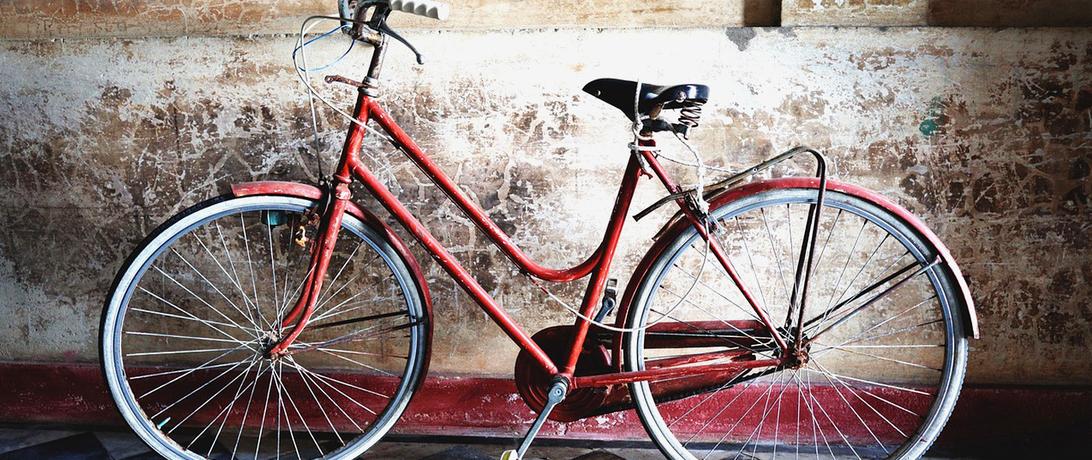
In the 1880’s women in America and England were considered "fast" if they rode bicycles. Their clothes changed from long skirts to split pants that some considered detrimental to the female sex. Bicycle riding was also thought to be a danger to fertility.
On Human Rights Day, December 10th, it’s good to remember the rights we enjoy.
It took me a long time to learn how to ride a bicycle. At age seven, the training wheels embarrassing but I could not find my balance without them. When the training wheels finally came off of my light blue, 10-speed Scwhinn, I did something that drove my mother crazy: I undid both of my long braids.
I was ten and my braids were down to my knees. My hair was very important back then. It was what I could set the clock by--in the morning it would be combed out and braided, and at night it would be rubbed with coconut and jasmine oil. Every other night I needed help to wash it. My hair was so long and thick that my hands were too small to hold it all. There was a kind of passive control exerted on me through my hair. I was learning all the old ways of being a woman. To be bound up, taken in, put in place. Not messy.
But on my bicycle, I decided to undo my hair to see what it would feel like to have the wind it in. I went to the top of the hill near my house. I decided to ride barefoot, very fast, all the way to the bottom. My hair was a black flag flying behind me. Other children tried to catch up and I remember one boy reaching out his hand just to touch the streaming ends.
My feet hurt on the pedals so I lifted them up and straight out, and soon my whole small frame was like a shooting star with an ebony bright tail behind me until I reached the bottom of the hill and then wiped out, skinned my knee, and got up to run barefoot to the top of the hill to do it again.
In the 1880's women in America and England were considered "fast" if they rode bicycles. Their clothes changed from long skirts to split pants that some considered detrimental to the female sex. Bicycle riding was also thought to be a danger to fertility. Bicycles were dangerous because who knows what will happen when a woman decides to spread her legs without a man around?
Where will she go? What will she do?
But clothes change.
Hair comes undone.
And women are still not allowed to ride their bicycles.
In 2008, Hamas banned bicycle riding for women in the Gaza Strip.
The women in Gaza don't bicycle everyday--perhaps they walk or even drive.
In April 2013, Saudi Arabia lifted the ban on women and bicycles. Almost. Saudi women cannot pedal their bikes to go anywhere. They can only use it for "entertainment" and if chaperoned by a male relative. And only in a private, designated space, away from men, away from anyone really. They can only bicycle in their backyard, if they have one.
A newspaper clipping I have from a British paper says, "While women are allowed to drive in Iran, cycling is socially frowned upon. During the 2012 Olympics Ayatollah Elm Alhuda, an Imam in Mashad, argued: ‘It is not a sin for a woman to sit on a bicycle saddle, provided she does so indoors or in her backyard…But if she cycles in public her movements and posture will lead to corruption and prostitution.’"
Iran Issues Fatwa Against Women Riding Bicyles
But in September 2016, a new fatwa was issued in Iran. Ayatollah Al Khameni said, "Riding a bicycle often attracts the attention of men and exposes the society to corruption, and thus contravenes women's chastity, and it must be abandoned.”
In defiance, Iranian women are uploading pictures of themselves riding bicycles to My Stealthy Freedom, a Facebook campaign highlighting women’s rights, or lack thereof, in Iran.
But Iranian women are not alone. In 2013, women in North Korea were banned from riding their bikes. If they do, they will be fined.
In 1896, Susan B. Anthony told the New York World's Nellie Bly, that bicycling had "done more to emancipate women than anything else in the world."
Another early western feminist, Maria E. Ward, also loved her bicycle and the liberation it provided. "Riding the wheel, our own powers are revealed to us," she wrote in Bicycling for Ladies, published in the same year.
I haven't ridden my bike in many years--I don't want to wear a helmet and shin guards, and watch out for car doors opening in the middle of the street. I want to let my hair out and bike in the middle of an empty road. I don't really want to go anywhere in particular.
Most importantly, as a matter of dignity and self-respect, I cannot accept anything less than the right to know what it feels like to “reveal” my own power to myself.
Article Details
Published
Topic
Program
Content Type
Opinion & Insights